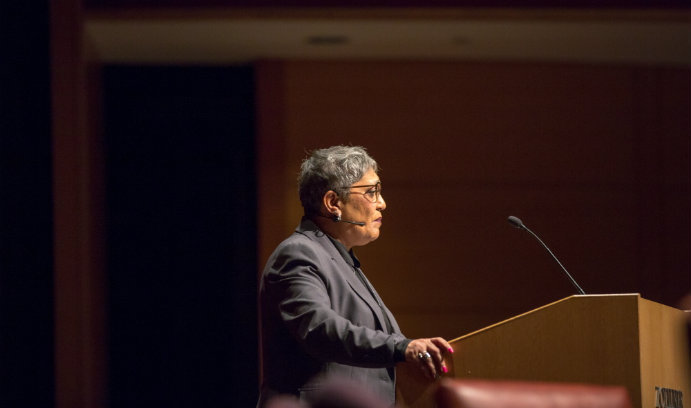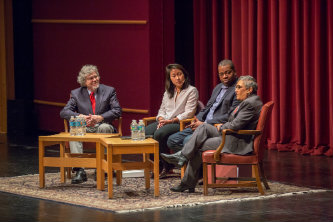Daughter of Charleston Church Shooting Victim Speaks at Lehigh

The Rev. Sharon Washington Risher addresses the process of forgiveness in MLK talk.
As a trauma chaplain, the Rev. Sharon Washington Risher works with families who have lost loved ones to gun violence. But nothing prepared her for what she needed herself when personal tragedy struck on June 17, 2015: Her mother, two cousins, a childhood friend and five others were killed in a hail of gunfire inside a South Carolina church by self-described white supremacist Dylann S. Roof.
“To say I’m truly overwhelmed with raw emotion 21 months after this tragedy happened is understating what I really feel,” said Risher, speaking Tuesday at Baker Hall in the Zoellner Arts Center. Her talk was presented by Lehigh’s Martin Luther King Jr. committee.
Her voice at times breaking, Risher described in painstaking detail the “gunshots and horror” that confronted her mother, Ethel Lance, and the other parishioners of the iconic Mother Emanuel African Methodist Church on that fateful summer night in Charleston. She spoke also about racial bigotry and hate, her emotional struggles throughout Roof’s trial and sentencing, the process of forgiveness, and her work with Everytown and Moms Demand Action for Gun Sense in America.
“Lives have changed, and people like me have found ourselves trying to figure out, where do we go from here?” said Risher, who is a staff chaplain and trauma specialist with Parkland Hospital in Dallas, Texas. “How do we pick up…our lives that have been shattered into pieces?”
That hot summer night, Roof had come into the church “with evil and hate in his heart and left a path of destruction,” she said. He killed [the nine parishioners] because of the color of their skins.”
As she sat in the courtroom during Roof’s trial and sentencing—he was found guilty of the killings in December 2016, and the following month, sentenced to death by a federal jury—Risher tried to understand how someone so young could harbor so much hate. She said she saw Roof’s conviction as a message to all that America would not tolerate such magnitude of hate.
Still, she said, she had struggled with the federal government’s decision to seek the death penalty in the case. “The God that I serve, my understanding is that no one human being has the right to take someone else’s life even for the most heinous crime, even for killing nine people in cold blood,” she said. “Sometimes when you stand up for your conviction, you might find yourself standing alone.”
She acknowledged there had been “glimpses of time” when she wanted Roof dead. But, she said, “The Holy Spirit would bring me back to being the spiritual person that I am, that I try to be every day, every breath of my life. I couldn’t stay in my humanness, I had to come back. Because if I stayed in my humanness, I don’t know if I would ever crawl from under the heaviness.”
Risher said she continues to work through the process of forgiveness.
“Forgiveness is a spiritual movement within your soul,” she said. “It’s not to be taken lightly. For me, such acts of violence and hate and destruction did not leave any space in my heart for forgiveness. Yet, as a pastor, I know that I have to get there. I know that. … I’m not bitter, I don’t think about Dylann much. I know that I will get there but I will get there in my own time.”
Risher said she was taken aback when, just 48 hours after the killings, one of her sisters and family members of other shooting victims told Roof at a court appearance that, despite their pain, they were forgiving him for his heinous acts. Later, President Obama spoke at a memorial service for the victims and started to sing “Amazing Grace.” But, Risher said, “there was no amazing grace for me.
“I was not ready to deal with that. I wanted people to know that that was not how everybody felt. Not all of us were warm and fuzzy wanting to forgive. Some people believe there should be instant forgiveness. But I wanted time to process my thoughts, be authentic about what I felt.”
Risher said she has come to understand that the city of Charleston needed that calming influence. “Charleston could have become Ferguson in an instant,” she said. “The city could have gone up in flames, but the God that I believe in, the God that nine angels believed in, would not have it.”
Since the killings, Risher has become an advocate for gun law change—not, she said, gun control.
If law enforcement had done its due diligence in completing a thorough background check, she said, Roof would not have been able to purchase the .45-caliber pistol he used in the killings.
“So what we’re trying to do is to get laws that we have strengthened so we don’t have to worry about being in a church and being gunned down,” said Risher, who is involved with the advocacy groups Everytown and Moms Demand Action for Gun Sense in America.
“It’s a movement of Americans working together to end gun violence and build safer communities for all,” she said. “Gun violence touches every town in America. For far too long, change has been prevented by the Washington gun lobby, and by the leaders who refuse to take common sense steps that will save lives. Together we are fighting for the changes that we all know will save us.”
Risher called on those in the audience to get involved. “If it’s in your heart to become part of the change, stand up. Let your voice be heard….If there is just one person that is affected by what I have said today, my job has been done.
“Stand up, people. Stand up for what you believe. Follow your faith or whatever gets you through the day knowing that you will make a difference. Your voice will be heard.”
Posted on:





